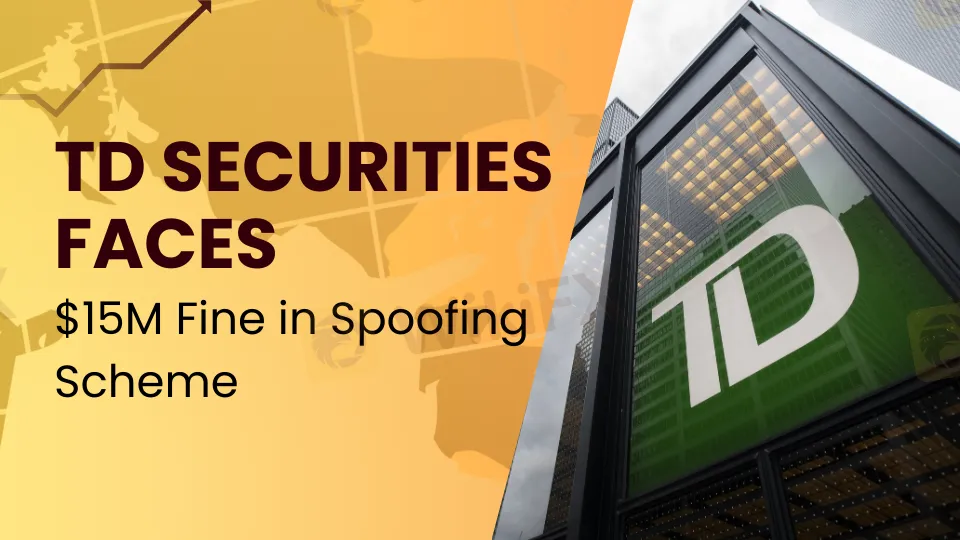简体中文
繁體中文
English
Pусский
日本語
ภาษาไทย
Tiếng Việt
Bahasa Indonesia
Español
हिन्दी
Filippiiniläinen
Français
Deutsch
Português
Türkçe
한국어
العربية
TD Securities Faces $15M Fine in Spoofing Scheme
Abstract:TD Securities was fined $15M for manipulating the U.S. Treasury market through an illegal spoofing strategy. SEC and DOJ impose penalties for broker-dealer failures.

SEC Charges TD Securities for Market Manipulation
The Securities and Exchange Commission (SEC) has issued major charges against TD Securities (USA) LLC for fraudulent trading activities in the US Treasury cash securities market. The registered broker-dealer was discovered to have utilized an unlawful trading practice known as spoofing, which is putting non-bona fide orders with no intention of execution to influence market prices.
Between April 2018 and May 2019, a trader at TD Securities reportedly engaged in hundreds of fake transactions, disrupting the market and resulting in huge gains for the business. The SEC's inquiry revealed that the trader who supervised the US Treasuries trading desk purposefully misled the market by canceling these non-bona fide orders after obtaining favorable pricing for real transactions.
Supervision Failures and Lack of Control
Along with the accusations of market manipulation, the SEC has emphasized TD Securities' inability to supervise its traders effectively. Despite internal warnings about abnormal trading activity, the business did not take adequate steps to investigate or prevent future misbehavior. This broker-dealer supervisory violation has serious regulatory ramifications.

Mark Cave, Associate Director of the SEC's Division of Enforcement, underlined the need for strong regulation in financial institutions. “Manipulative trading undermines trust in our markets. Firms cannot disregard their workers' unethical behavior. This action demonstrates our commitment to combating illegal trading schemes,” Cave said.
Penalties imposed by SEC, DOJ, and FINRA
TD Securities has agreed to resolve the accusations and pay a $15 million fine issued by the SEC, DOJ, and FINRA. This penalty consists of $400,000 in disgorgement, a $6.5 million civil penalty, and a corresponding $6 million punishment from FINRA.
As part of a deferred prosecution deal with the Department of Justice, TD Securities admitted to violating the antifraud provisions of US securities laws. The company has been urged to refrain from additional offenses and chastised for its insufficient internal controls.
Related News:
Broader Impact on Financial Institutions
The SEC's lawsuit against TD Securities demonstrates the increasing regulatory attention on combating unlawful trading methods such as spoofing. Regulatory and compliance officials at financial institutions, especially those in large financial centers such as New York and Washington, D.C., are reminded of the crucial necessity for strong supervision procedures. Failure to effectively supervise trading desks may lead to serious financial and legal implications.
The fines issued are a strong signal to corporations participating in the US Treasury securities markets. Financial professionals, notably brokers, traders, and investors, must be diligent in maintaining ethical trading practices to maintain market integrity.
Stay informed on the latest developments regarding TD Securities and market manipulation. For more insights, visit the TD Securities page on WikiFX now!

Disclaimer:
The views in this article only represent the author's personal views, and do not constitute investment advice on this platform. This platform does not guarantee the accuracy, completeness and timeliness of the information in the article, and will not be liable for any loss caused by the use of or reliance on the information in the article.
Read more

XTB Hack 2025: Major Security Breach Exposes Client Accounts
XTB suffers a major hack in 2025, with hackers draining client accounts and sparking urgent security upgrades. Learn how the breach unfolded and what’s next.

XTB Hack 2025: Major Security Breach Exposes Client Accounts
XTB suffers a major hack in 2025, with hackers draining client accounts and sparking urgent security upgrades. Learn how the breach unfolded and what’s next.

Mumbai Police Nabs Black Paper Dollar Conversion Forex Scam Perpetrators: Check Out the Details
The crime branch of the Mumbai Police has nabbed a racket involved in duping people by claiming to convert black paper into dollars. Check this unique 24.7-lakh scam story.

Risk Involved with Cabana Capital – Every Trader Should Know
Cabana Capital has changed its name and logo, basically everything about its identity. This seems a bit suspicious, and it's something you should definitely be concerned about. In this article, you’ll learn about the red flags that every trader needs to watch out for.
WikiFX Broker
Latest News
Manual vs. Automated Forex Trading: Which One Should You Choose?
Scammed by a Click: He Lost RM300,000 in a Month
Revealing Factors That Help Determine the Gold Price in India
Why Regulatory Compliance Is the Secret Ingredient to Trustworthy Forex Brokers
How Are Trade Policies Affecting the Aluminum Market?
US Government Interest Grows in Victory Metals’ Rare Earths Supply
RM71,000 Lost in a Share Scheme That Never Existed
Pentagon to become largest shareholder in rare earth miner MP Materials; shares surge 40%
Delta shares jump 13% after airline reinstates 2025 profit outlook as CEO says bookings stabilized
Delta shares jump 12% after airline reinstates 2025 profit outlook as CEO says bookings stabilized
Currency Calculator



